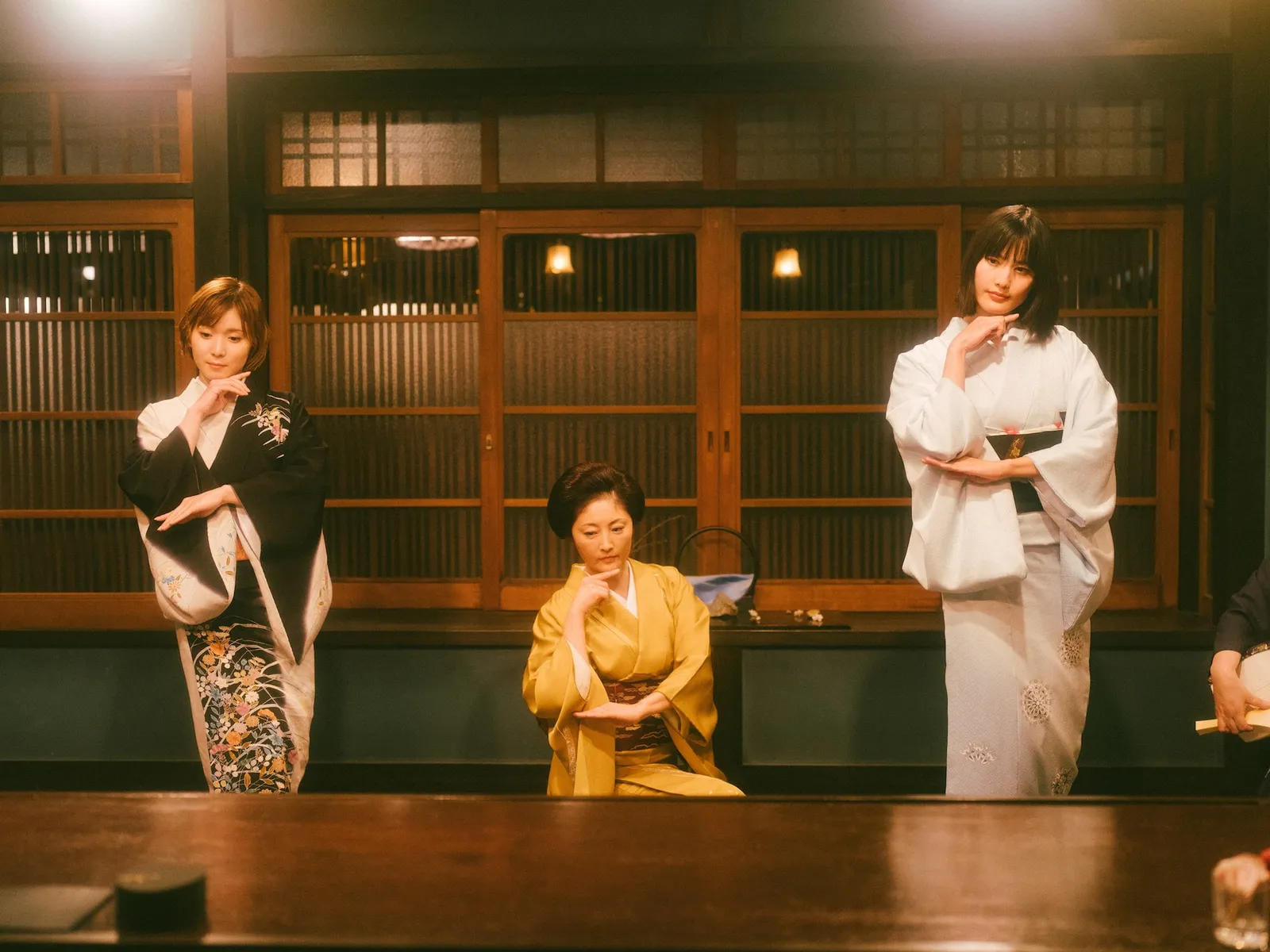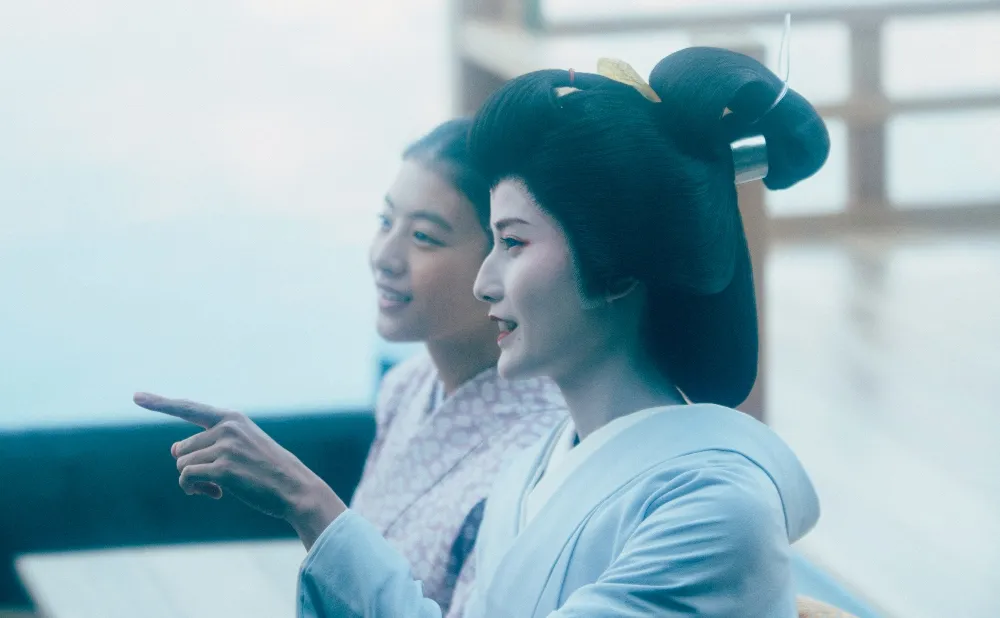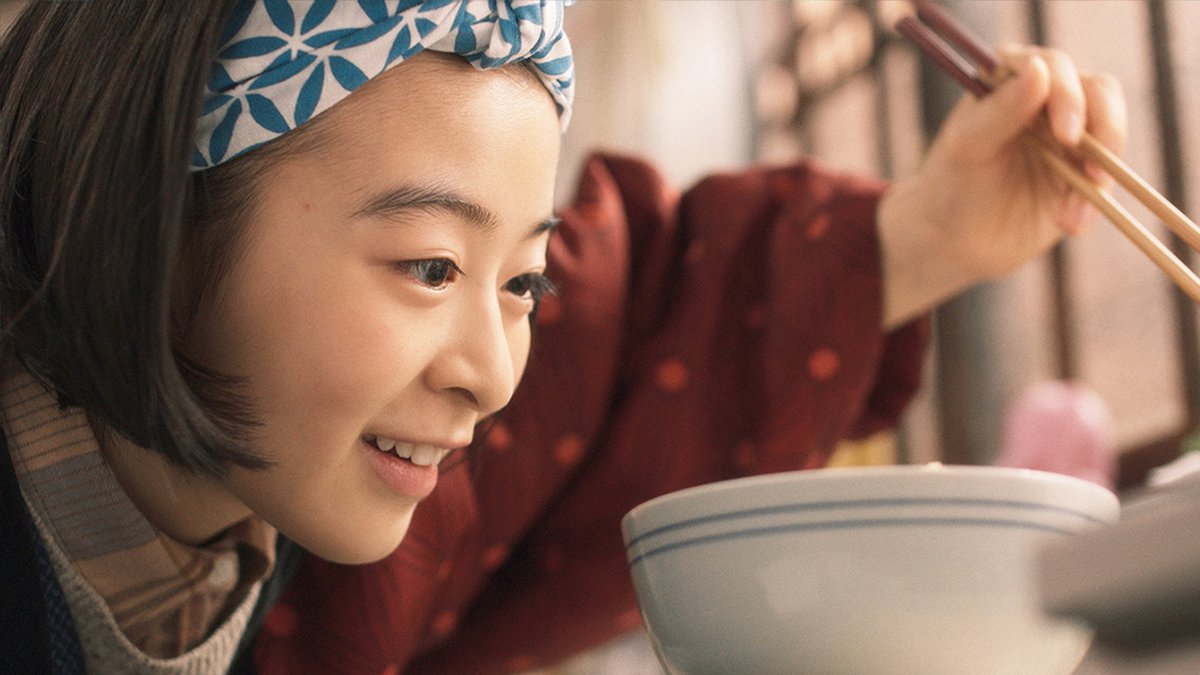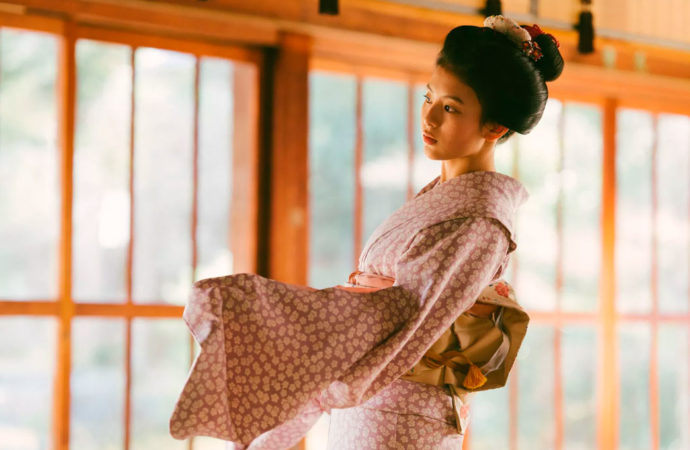In the series Makanai:Cooking for the Maiko House, Hirokazu Koreeda adapts for Netflix the bestselling manga by Aiko Koyama, which depicts the daily lives of aspiring maiko (apprentice) and geiko (geisha) in Kyoto’s Gion district. The nine episodes unfold the experiences of a group of teenagers over the course of a year, introducing us to the story through Kiyo (Mori Nana) and Sumire (Natsuki Deguchi), who will become Momohana when she achieves maiko status.)
In the first episode, both leave the city of Aomori to live their dream at the age of sixteen, Sumire has a natural talent that matches the elegance of her new job, while Kiyo, clumsy and not gifted in such a delicate art, ends up finding her passion in the kitchen. Without judgement or discrimination, the film highlights the value of a non-hierarchical vocation and the service it provides to others. The pair of friends, whose complicity and mutual support is evident episode by episode, in every season of the year, find happiness in a new home. The two form a partnership that combines stoicism and a touch of eccentricity, as Momoko, the ideal geiko, describes.

Unlike some of Koreeda’s best films, neither the drama is slow-cooked, nor the dart is sharpened throughout the film, because there is none, and we don’t expect to see the darkest corners of the family institution in any of its formats. For example, in Makanai the apprentices do not pay a tragic price as a renunciation to follow their vocation, and on the other hand, the generational clash is limited to a friction, while the resentment or misunderstanding between mothers (or fathers) and daughters is diluted in love.
The yakata will be Kiyo and Sumire’s new home, a three-storey doll’s house, where they will live in the care of two mothers, sharing their days with several sisters as if in a boarding school, leaving to attend classes, grab a hamburger in their free time or visit their families on holidays. The house will be at the centre of the experiences, the levels of intimacy ascending from the ground floor where the hearth is located —in the kitchen from which all the affection Kiyo is able to channel through her exquisite and simple dishes emanates— to the rooftop balcony, where tête à tête conversations or contemplative moments of solitude or concentration take place. The space becomes an emotional terrain, where the maiko, geiko, and the characters that surround them gradually create a cosy and beneficent atmosphere, imbuing each chapter with enough restraint so that we are not distanced by sentimentality; on the contrary, it draws us in and makes us feel that it is a place where we feel good, where we like to be, somehow inhabiting those meagre spaces, invisible and unnoticed by others.

The series is directed and written by Koreeda with an in-house team of Megumi Tsuno, Hiroshi Okuyama and Takuma Sato, where the Palme d’Or winner with Shoplifters (2018) condenses his compassionate gaze and humanism, accompanied by a wonderful soundtrack by Yôko Kanno (“Maiko of The Living Dead” is a delight). The stylistic choices are delicate and thoughtful, especially in the placement of the camera. The overhead shots that emphasise the chorality and courage of the group gathered at lunchtime, and those others in which it seems unwilling to intervene and pause on the threshold, while the girls rehearse a carnival charade, for example, are an affirmation of principle, a moral choice. Makanai is neither a tourist film nor a documentary. It is the opposite of Memoirs of a Geisha, here the girls are not sold, but come freely after high school, with their parents’ permission, to train for a traditional artistic profession. The trainees are not allowed to have a mobile phone, but they watch films.
The history, the traditions, and the roles that orbit in this microcosm are not explained or illustrated to us, and we are grateful that we have the sensation of observing without being seen, at the risk of not understanding, because otherwise we would feel like tourists on a tour, invading the intimacy and everyday life of its protagonists. In Makanai there is no morbidity or cheap exoticism, there are simple stories of human beings united in a destiny, who play different roles in a world that suits them, where they find the closest thing to happiness. Thus we find the two mothers who run the yakata, one of them (Azusa) the literal mother of a teenage girl (Ryoko) who is the loose verse in the house; the beautiful and ultra-perfect Momoko (Ai Hashimoto), who lives in her own modern flat, where, fascinated by zombies, she plays playstation, and goes to the film library with her architect boyfriend to watch Night of the Living Dead; the sober and solicitous barman, who always resorts to the most suitable cocktail for his client (played by the excellent Lily Franky, who played the father in Shoplifters), behind the bar of the tiny bar attached to the maiko’s house, seeing the world from another perspective; the architecture teacher in love with Azusa; the otokoshi, in charge of dressing the maiko in kimonos, who are the only strangers allowed in the house; Ryoko’s distant father. … the dramas are everyday, they are revealed and gain importance over the course of the nine chapters, but when we look back, our minds conjure up images of teenage girls eating and chatting, joking and bursting with love.
The scenes of the classes are few and far between, there is no preciousness in photographing their movements or their mai (dances). It is precisely in the last chapter where this choice of script —unlike what other series with a more traditional or gimmicky narrative are used to— is most valued, giving us a perfect ellipsis that places us where we should be, waiting. The intimacy shown with the respect due to its characters, tenderness, companionship, tolerance, imbues the series with its small gestures, the rays of the sun on the breakfast table, Kiyo’s delicate dishes…, a process that begins with the adventure of daily shopping, full of discoveries, of individual characters who are experts in what they sell, while Kiyo mentally creates associations between food, emotions, memories and people.
The love for food and for diners creates a bubble of happiness in which those who live by making and those who live by eating float, and the correlation of recipes and emotions flows with a naturalness inversely proportional to those vacuous foodxploitation films, where the delicacies are only a reflection of the smugness of the person who prepares them. Throughout the series, we will hear “normal” several times, always with a positive nuance. Symbolically, Kiyo’s challenge will be to prepare dishes that meet this condition, considering the thousand regional variations of each recipe of Japanese cuisine, because what he will achieve will be to satisfy all the palates of the household, stimulating their memories, soothing their discomfort, celebrating, and bringing his own goodness.

The question of feminism, atavism and tradition, anachronisms or the obstacles to combining a modern life in a world encapsulated and anchored in the past, with immovable roles, are not raised or resolved in Makanai, nothing is hinted at, beyond what we are shown, we do not know the structure of the business or the conditions of their work. It will be the tourist viewers who will wonder whether training young girls to perform for men in traditional dance, music or singing is discriminatory or demeaning, whether they are nowadays protected in the workplace, and whether it is permissible for them to have to give up their careers if they are married. The maiko in the series have fun like Little Women, support each other like Our Little Sister, and discover that the walking of the living dead was choreographed before by the actors of the nō theatre, gliding on their feet, remembering their past lives.











No one has posted any comments yet. Be the first person!